Accounting: Business Information System, AI, and E-Data Transfer
VerifiedAdded on 2022/11/14
|11
|2400
|258
Report
AI Summary
This report comprehensively examines the integration of business information systems, artificial intelligence (AI), and electronic data transfer within the field of accounting. It begins by outlining the role of business information systems in enhancing efficiency and decision-making in financial operations, followed by an in-depth analysis of AI's impact, including its ability to automate tasks, analyze large datasets, and improve accuracy in areas such as expense management, audits, and AI chatbots. The report then explores the advantages of electronic data transfer, particularly electronic fund transfers, highlighting benefits like reduced costs, increased security, and faster processing times. The conclusion underscores the transformative effects of these technologies on accounting, emphasizing the shift towards more efficient, cost-effective, and accurate financial practices, while also acknowledging the ongoing evolution of these systems and their potential to further reshape the accounting landscape.

Running Head: ACCOUNTING
Accounting
Name of the Student
Name of the University
Author Note
Accounting
Name of the Student
Name of the University
Author Note
Paraphrase This Document
Need a fresh take? Get an instant paraphrase of this document with our AI Paraphraser

1ACCOUNTING
Executive summery
The emerging technologies in the twenty first century have benefited several fields and one such
field is accounting. The business information system related to accounting have shown its
positive effects as the information meets with technology and creating an efficient area of easy
transaction of documents and money. The system collects data and process those data for
generating required information and later takes important decisions. The introduction of
Artificial Intelligence with accounting have enable the financial companies to manage huge
amount of data efficiently and accurately. The AI chat-bots are doing several tasks of accounting
in place of humans such as, payment closure, expense management, audits etc. The structured
format of electronic fund transfer with the means like electronic mailbox have increased security
of documents and funds. This process also allows the transfer of invoices, orders, accounting
sheets etc. This process is considered to be safe, fast and less time consuming.
Executive summery
The emerging technologies in the twenty first century have benefited several fields and one such
field is accounting. The business information system related to accounting have shown its
positive effects as the information meets with technology and creating an efficient area of easy
transaction of documents and money. The system collects data and process those data for
generating required information and later takes important decisions. The introduction of
Artificial Intelligence with accounting have enable the financial companies to manage huge
amount of data efficiently and accurately. The AI chat-bots are doing several tasks of accounting
in place of humans such as, payment closure, expense management, audits etc. The structured
format of electronic fund transfer with the means like electronic mailbox have increased security
of documents and funds. This process also allows the transfer of invoices, orders, accounting
sheets etc. This process is considered to be safe, fast and less time consuming.
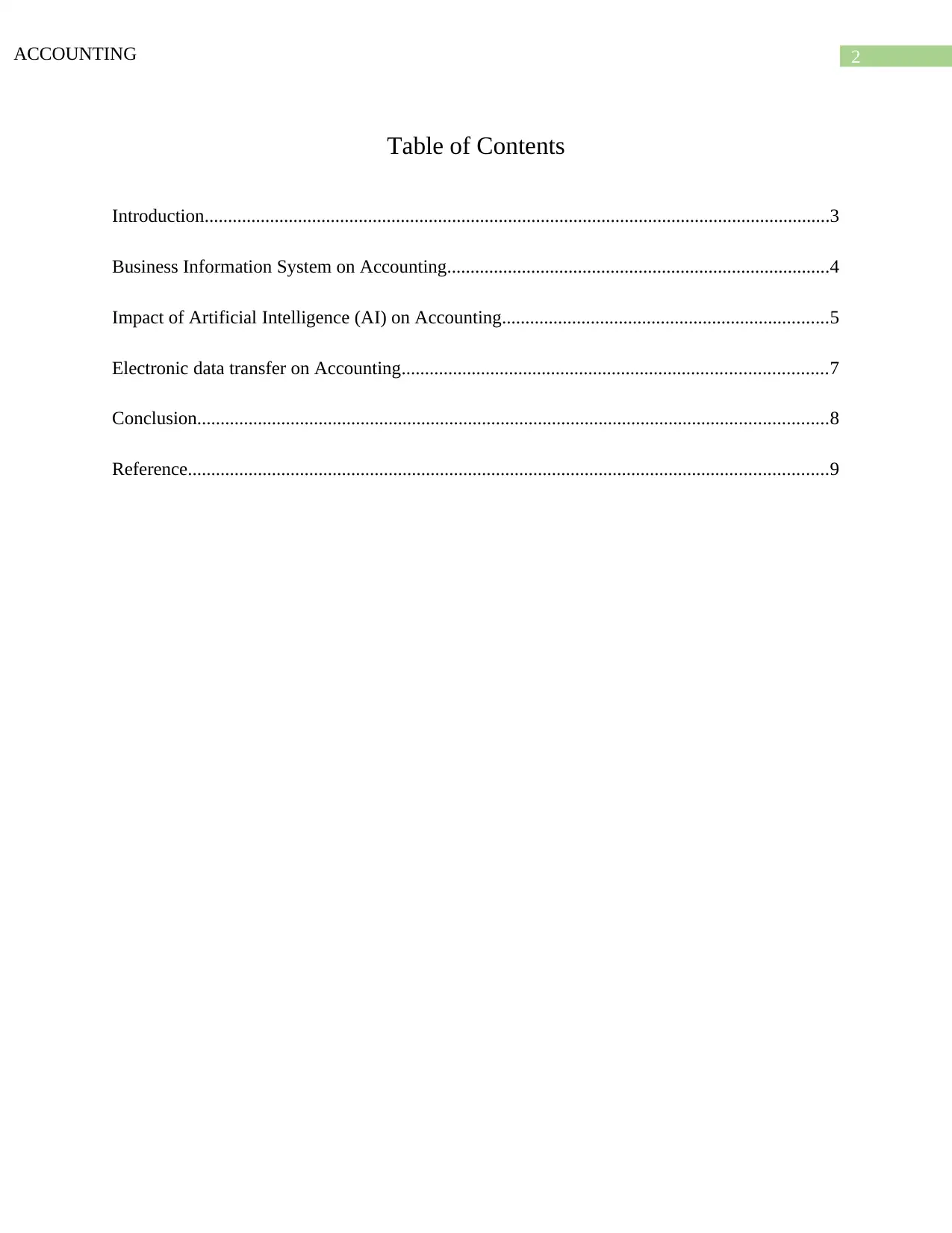
2ACCOUNTING
Table of Contents
Introduction......................................................................................................................................3
Business Information System on Accounting..................................................................................4
Impact of Artificial Intelligence (AI) on Accounting......................................................................5
Electronic data transfer on Accounting...........................................................................................7
Conclusion.......................................................................................................................................8
Reference.........................................................................................................................................9
Table of Contents
Introduction......................................................................................................................................3
Business Information System on Accounting..................................................................................4
Impact of Artificial Intelligence (AI) on Accounting......................................................................5
Electronic data transfer on Accounting...........................................................................................7
Conclusion.......................................................................................................................................8
Reference.........................................................................................................................................9
⊘ This is a preview!⊘
Do you want full access?
Subscribe today to unlock all pages.

Trusted by 1+ million students worldwide
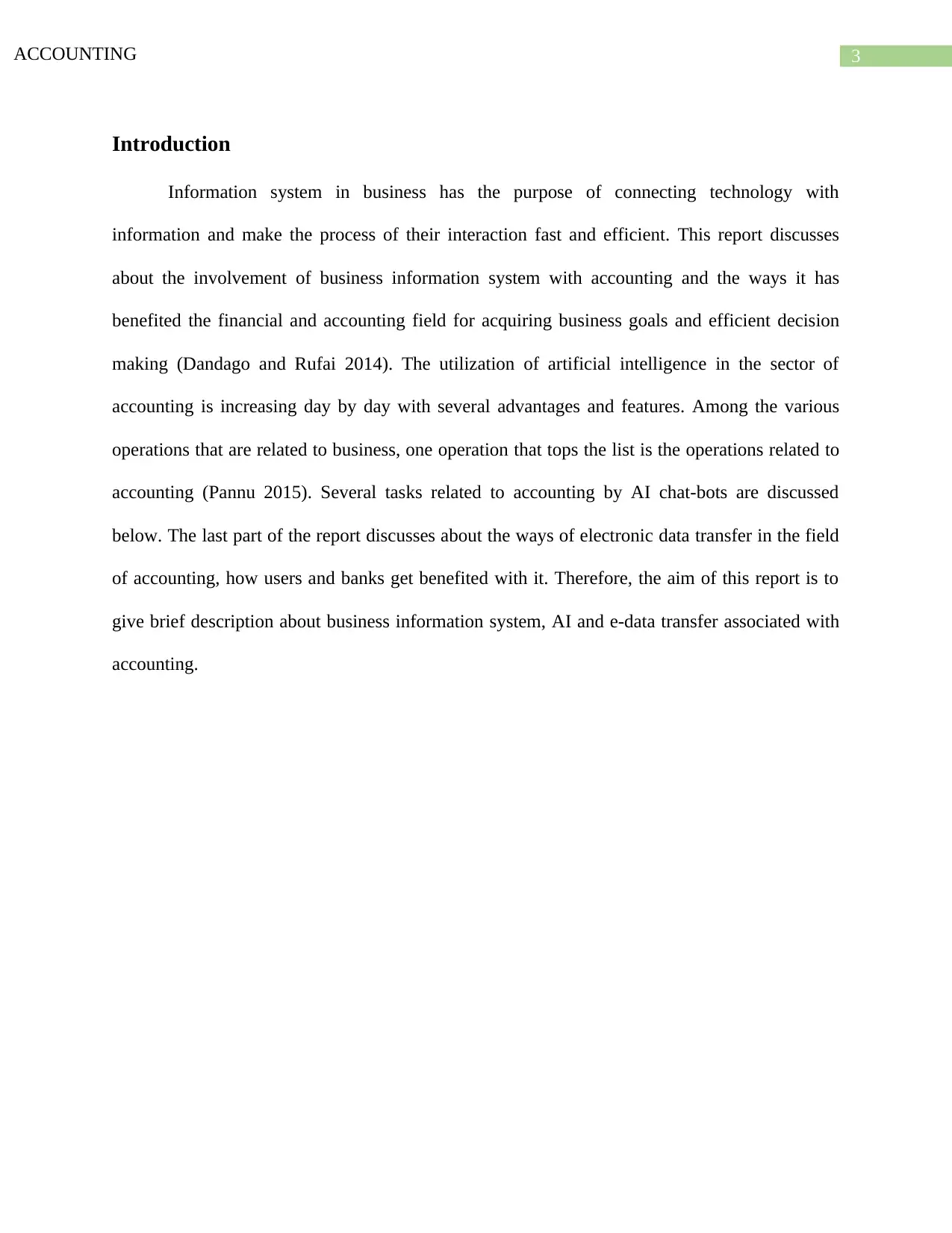
3ACCOUNTING
Introduction
Information system in business has the purpose of connecting technology with
information and make the process of their interaction fast and efficient. This report discusses
about the involvement of business information system with accounting and the ways it has
benefited the financial and accounting field for acquiring business goals and efficient decision
making (Dandago and Rufai 2014). The utilization of artificial intelligence in the sector of
accounting is increasing day by day with several advantages and features. Among the various
operations that are related to business, one operation that tops the list is the operations related to
accounting (Pannu 2015). Several tasks related to accounting by AI chat-bots are discussed
below. The last part of the report discusses about the ways of electronic data transfer in the field
of accounting, how users and banks get benefited with it. Therefore, the aim of this report is to
give brief description about business information system, AI and e-data transfer associated with
accounting.
Introduction
Information system in business has the purpose of connecting technology with
information and make the process of their interaction fast and efficient. This report discusses
about the involvement of business information system with accounting and the ways it has
benefited the financial and accounting field for acquiring business goals and efficient decision
making (Dandago and Rufai 2014). The utilization of artificial intelligence in the sector of
accounting is increasing day by day with several advantages and features. Among the various
operations that are related to business, one operation that tops the list is the operations related to
accounting (Pannu 2015). Several tasks related to accounting by AI chat-bots are discussed
below. The last part of the report discusses about the ways of electronic data transfer in the field
of accounting, how users and banks get benefited with it. Therefore, the aim of this report is to
give brief description about business information system, AI and e-data transfer associated with
accounting.
Paraphrase This Document
Need a fresh take? Get an instant paraphrase of this document with our AI Paraphraser
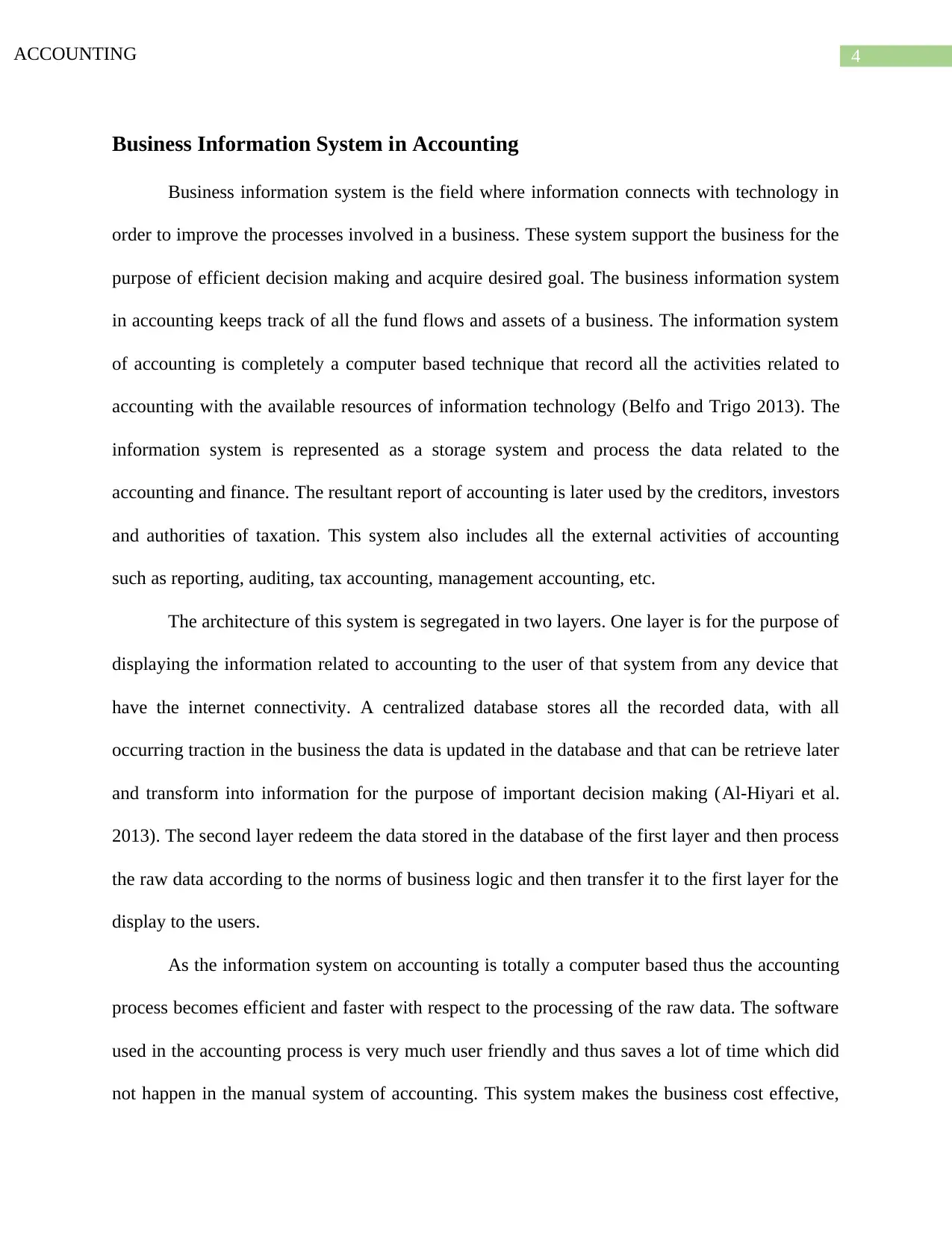
4ACCOUNTING
Business Information System in Accounting
Business information system is the field where information connects with technology in
order to improve the processes involved in a business. These system support the business for the
purpose of efficient decision making and acquire desired goal. The business information system
in accounting keeps track of all the fund flows and assets of a business. The information system
of accounting is completely a computer based technique that record all the activities related to
accounting with the available resources of information technology (Belfo and Trigo 2013). The
information system is represented as a storage system and process the data related to the
accounting and finance. The resultant report of accounting is later used by the creditors, investors
and authorities of taxation. This system also includes all the external activities of accounting
such as reporting, auditing, tax accounting, management accounting, etc.
The architecture of this system is segregated in two layers. One layer is for the purpose of
displaying the information related to accounting to the user of that system from any device that
have the internet connectivity. A centralized database stores all the recorded data, with all
occurring traction in the business the data is updated in the database and that can be retrieve later
and transform into information for the purpose of important decision making (Al-Hiyari et al.
2013). The second layer redeem the data stored in the database of the first layer and then process
the raw data according to the norms of business logic and then transfer it to the first layer for the
display to the users.
As the information system on accounting is totally a computer based thus the accounting
process becomes efficient and faster with respect to the processing of the raw data. The software
used in the accounting process is very much user friendly and thus saves a lot of time which did
not happen in the manual system of accounting. This system makes the business cost effective,
Business Information System in Accounting
Business information system is the field where information connects with technology in
order to improve the processes involved in a business. These system support the business for the
purpose of efficient decision making and acquire desired goal. The business information system
in accounting keeps track of all the fund flows and assets of a business. The information system
of accounting is completely a computer based technique that record all the activities related to
accounting with the available resources of information technology (Belfo and Trigo 2013). The
information system is represented as a storage system and process the data related to the
accounting and finance. The resultant report of accounting is later used by the creditors, investors
and authorities of taxation. This system also includes all the external activities of accounting
such as reporting, auditing, tax accounting, management accounting, etc.
The architecture of this system is segregated in two layers. One layer is for the purpose of
displaying the information related to accounting to the user of that system from any device that
have the internet connectivity. A centralized database stores all the recorded data, with all
occurring traction in the business the data is updated in the database and that can be retrieve later
and transform into information for the purpose of important decision making (Al-Hiyari et al.
2013). The second layer redeem the data stored in the database of the first layer and then process
the raw data according to the norms of business logic and then transfer it to the first layer for the
display to the users.
As the information system on accounting is totally a computer based thus the accounting
process becomes efficient and faster with respect to the processing of the raw data. The software
used in the accounting process is very much user friendly and thus saves a lot of time which did
not happen in the manual system of accounting. This system makes the business cost effective,
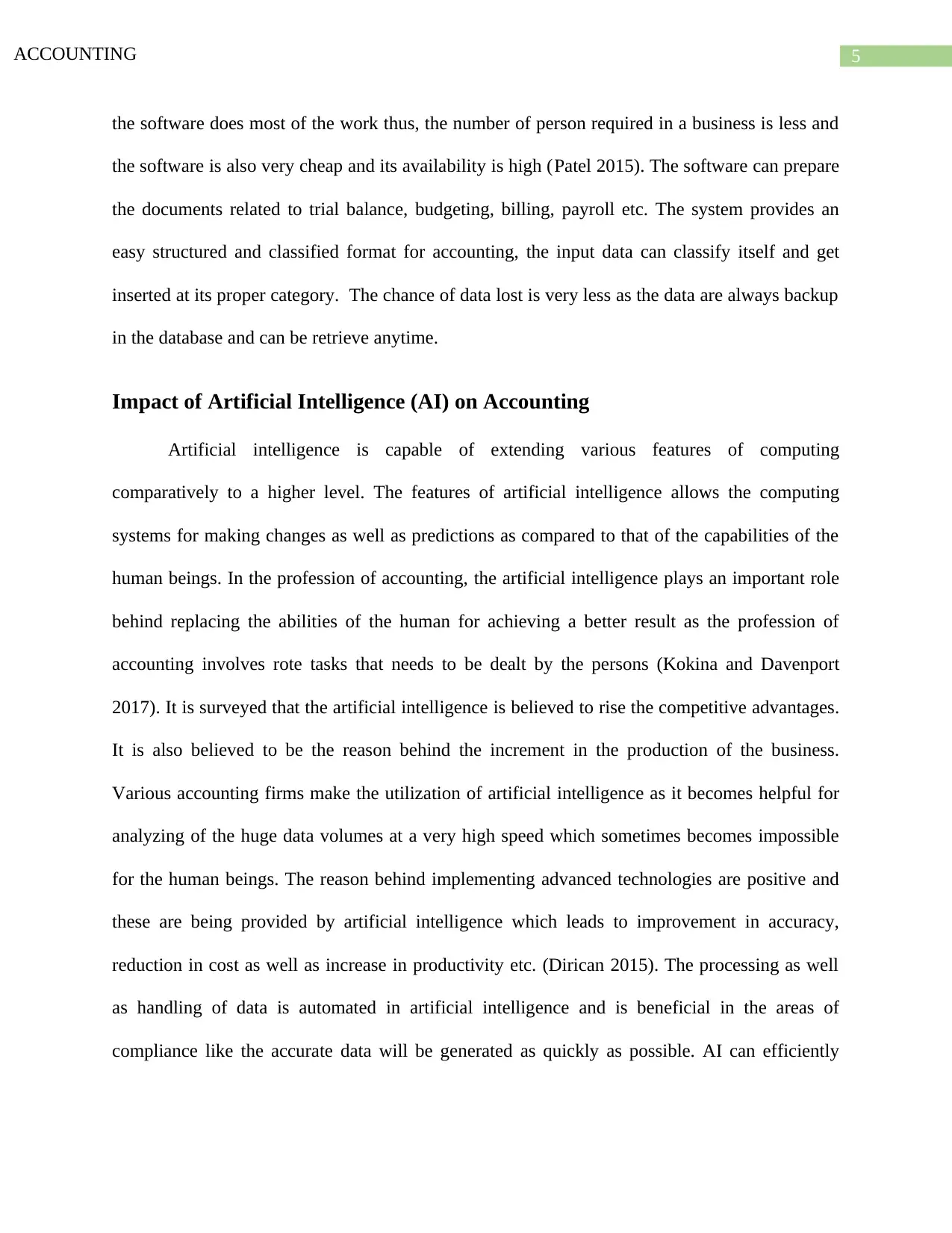
5ACCOUNTING
the software does most of the work thus, the number of person required in a business is less and
the software is also very cheap and its availability is high (Patel 2015). The software can prepare
the documents related to trial balance, budgeting, billing, payroll etc. The system provides an
easy structured and classified format for accounting, the input data can classify itself and get
inserted at its proper category. The chance of data lost is very less as the data are always backup
in the database and can be retrieve anytime.
Impact of Artificial Intelligence (AI) on Accounting
Artificial intelligence is capable of extending various features of computing
comparatively to a higher level. The features of artificial intelligence allows the computing
systems for making changes as well as predictions as compared to that of the capabilities of the
human beings. In the profession of accounting, the artificial intelligence plays an important role
behind replacing the abilities of the human for achieving a better result as the profession of
accounting involves rote tasks that needs to be dealt by the persons (Kokina and Davenport
2017). It is surveyed that the artificial intelligence is believed to rise the competitive advantages.
It is also believed to be the reason behind the increment in the production of the business.
Various accounting firms make the utilization of artificial intelligence as it becomes helpful for
analyzing of the huge data volumes at a very high speed which sometimes becomes impossible
for the human beings. The reason behind implementing advanced technologies are positive and
these are being provided by artificial intelligence which leads to improvement in accuracy,
reduction in cost as well as increase in productivity etc. (Dirican 2015). The processing as well
as handling of data is automated in artificial intelligence and is beneficial in the areas of
compliance like the accurate data will be generated as quickly as possible. AI can efficiently
the software does most of the work thus, the number of person required in a business is less and
the software is also very cheap and its availability is high (Patel 2015). The software can prepare
the documents related to trial balance, budgeting, billing, payroll etc. The system provides an
easy structured and classified format for accounting, the input data can classify itself and get
inserted at its proper category. The chance of data lost is very less as the data are always backup
in the database and can be retrieve anytime.
Impact of Artificial Intelligence (AI) on Accounting
Artificial intelligence is capable of extending various features of computing
comparatively to a higher level. The features of artificial intelligence allows the computing
systems for making changes as well as predictions as compared to that of the capabilities of the
human beings. In the profession of accounting, the artificial intelligence plays an important role
behind replacing the abilities of the human for achieving a better result as the profession of
accounting involves rote tasks that needs to be dealt by the persons (Kokina and Davenport
2017). It is surveyed that the artificial intelligence is believed to rise the competitive advantages.
It is also believed to be the reason behind the increment in the production of the business.
Various accounting firms make the utilization of artificial intelligence as it becomes helpful for
analyzing of the huge data volumes at a very high speed which sometimes becomes impossible
for the human beings. The reason behind implementing advanced technologies are positive and
these are being provided by artificial intelligence which leads to improvement in accuracy,
reduction in cost as well as increase in productivity etc. (Dirican 2015). The processing as well
as handling of data is automated in artificial intelligence and is beneficial in the areas of
compliance like the accurate data will be generated as quickly as possible. AI can efficiently
⊘ This is a preview!⊘
Do you want full access?
Subscribe today to unlock all pages.

Trusted by 1+ million students worldwide
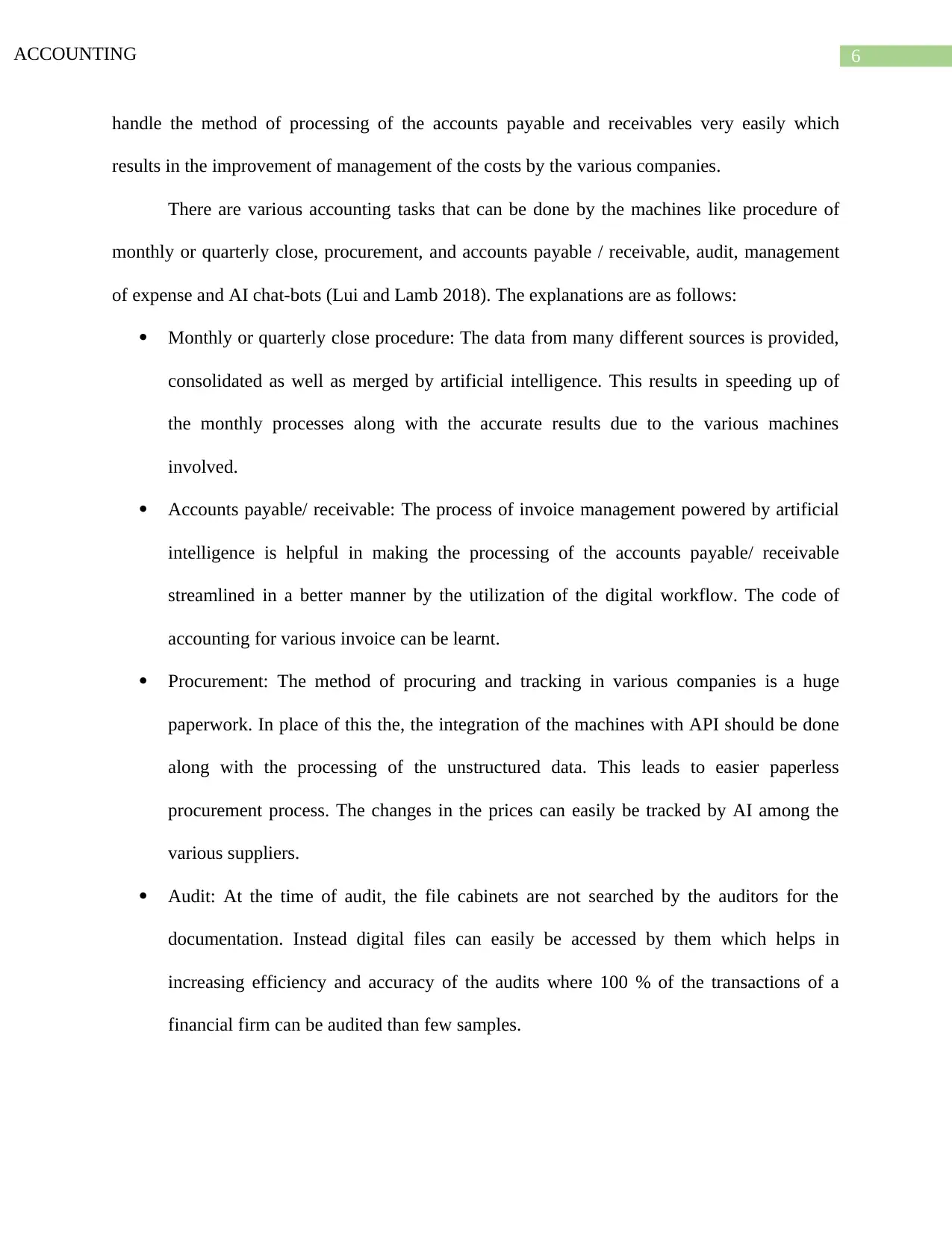
6ACCOUNTING
handle the method of processing of the accounts payable and receivables very easily which
results in the improvement of management of the costs by the various companies.
There are various accounting tasks that can be done by the machines like procedure of
monthly or quarterly close, procurement, and accounts payable / receivable, audit, management
of expense and AI chat-bots (Lui and Lamb 2018). The explanations are as follows:
Monthly or quarterly close procedure: The data from many different sources is provided,
consolidated as well as merged by artificial intelligence. This results in speeding up of
the monthly processes along with the accurate results due to the various machines
involved.
Accounts payable/ receivable: The process of invoice management powered by artificial
intelligence is helpful in making the processing of the accounts payable/ receivable
streamlined in a better manner by the utilization of the digital workflow. The code of
accounting for various invoice can be learnt.
Procurement: The method of procuring and tracking in various companies is a huge
paperwork. In place of this the, the integration of the machines with API should be done
along with the processing of the unstructured data. This leads to easier paperless
procurement process. The changes in the prices can easily be tracked by AI among the
various suppliers.
Audit: At the time of audit, the file cabinets are not searched by the auditors for the
documentation. Instead digital files can easily be accessed by them which helps in
increasing efficiency and accuracy of the audits where 100 % of the transactions of a
financial firm can be audited than few samples.
handle the method of processing of the accounts payable and receivables very easily which
results in the improvement of management of the costs by the various companies.
There are various accounting tasks that can be done by the machines like procedure of
monthly or quarterly close, procurement, and accounts payable / receivable, audit, management
of expense and AI chat-bots (Lui and Lamb 2018). The explanations are as follows:
Monthly or quarterly close procedure: The data from many different sources is provided,
consolidated as well as merged by artificial intelligence. This results in speeding up of
the monthly processes along with the accurate results due to the various machines
involved.
Accounts payable/ receivable: The process of invoice management powered by artificial
intelligence is helpful in making the processing of the accounts payable/ receivable
streamlined in a better manner by the utilization of the digital workflow. The code of
accounting for various invoice can be learnt.
Procurement: The method of procuring and tracking in various companies is a huge
paperwork. In place of this the, the integration of the machines with API should be done
along with the processing of the unstructured data. This leads to easier paperless
procurement process. The changes in the prices can easily be tracked by AI among the
various suppliers.
Audit: At the time of audit, the file cabinets are not searched by the auditors for the
documentation. Instead digital files can easily be accessed by them which helps in
increasing efficiency and accuracy of the audits where 100 % of the transactions of a
financial firm can be audited than few samples.
Paraphrase This Document
Need a fresh take? Get an instant paraphrase of this document with our AI Paraphraser
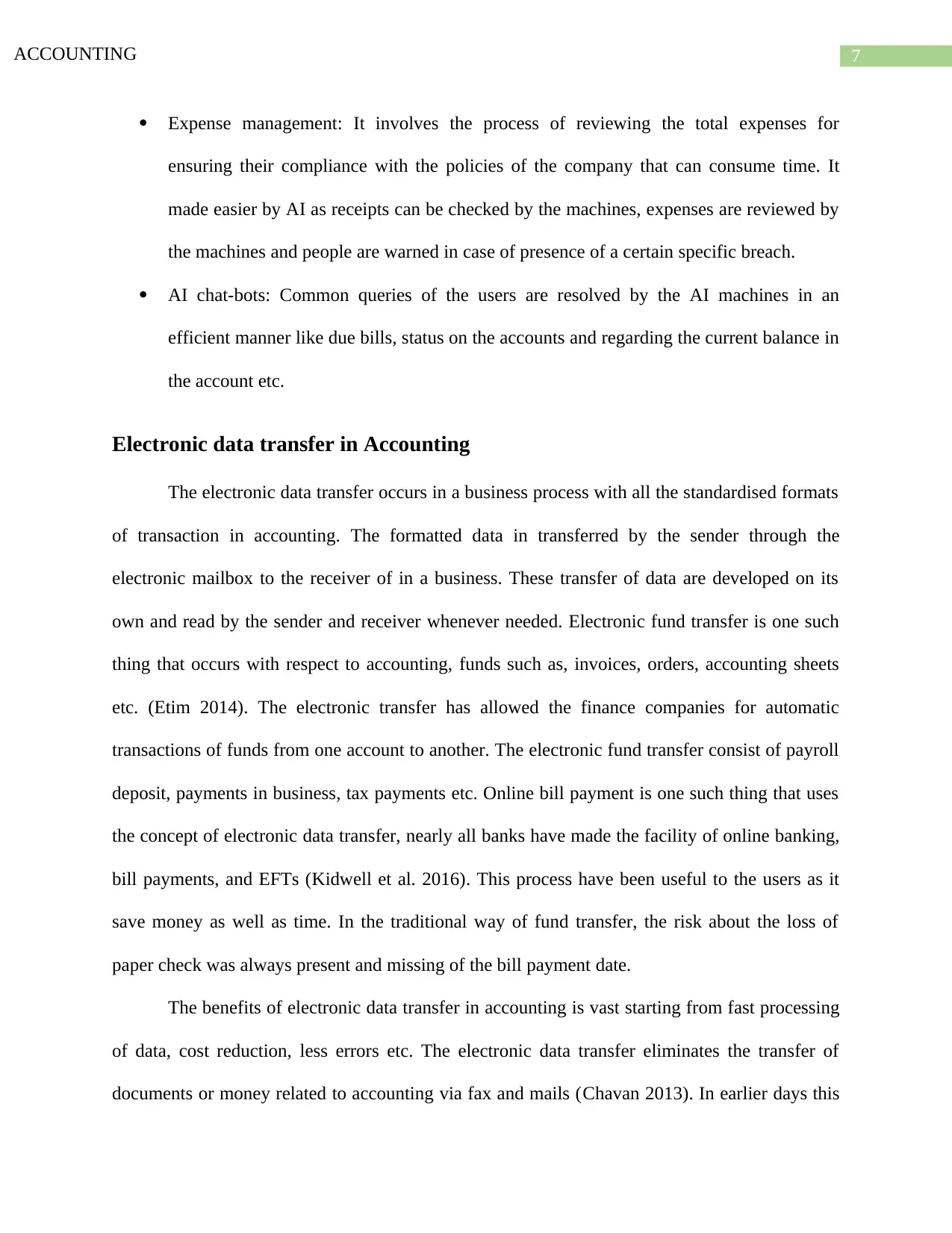
7ACCOUNTING
Expense management: It involves the process of reviewing the total expenses for
ensuring their compliance with the policies of the company that can consume time. It
made easier by AI as receipts can be checked by the machines, expenses are reviewed by
the machines and people are warned in case of presence of a certain specific breach.
AI chat-bots: Common queries of the users are resolved by the AI machines in an
efficient manner like due bills, status on the accounts and regarding the current balance in
the account etc.
Electronic data transfer in Accounting
The electronic data transfer occurs in a business process with all the standardised formats
of transaction in accounting. The formatted data in transferred by the sender through the
electronic mailbox to the receiver of in a business. These transfer of data are developed on its
own and read by the sender and receiver whenever needed. Electronic fund transfer is one such
thing that occurs with respect to accounting, funds such as, invoices, orders, accounting sheets
etc. (Etim 2014). The electronic transfer has allowed the finance companies for automatic
transactions of funds from one account to another. The electronic fund transfer consist of payroll
deposit, payments in business, tax payments etc. Online bill payment is one such thing that uses
the concept of electronic data transfer, nearly all banks have made the facility of online banking,
bill payments, and EFTs (Kidwell et al. 2016). This process have been useful to the users as it
save money as well as time. In the traditional way of fund transfer, the risk about the loss of
paper check was always present and missing of the bill payment date.
The benefits of electronic data transfer in accounting is vast starting from fast processing
of data, cost reduction, less errors etc. The electronic data transfer eliminates the transfer of
documents or money related to accounting via fax and mails (Chavan 2013). In earlier days this
Expense management: It involves the process of reviewing the total expenses for
ensuring their compliance with the policies of the company that can consume time. It
made easier by AI as receipts can be checked by the machines, expenses are reviewed by
the machines and people are warned in case of presence of a certain specific breach.
AI chat-bots: Common queries of the users are resolved by the AI machines in an
efficient manner like due bills, status on the accounts and regarding the current balance in
the account etc.
Electronic data transfer in Accounting
The electronic data transfer occurs in a business process with all the standardised formats
of transaction in accounting. The formatted data in transferred by the sender through the
electronic mailbox to the receiver of in a business. These transfer of data are developed on its
own and read by the sender and receiver whenever needed. Electronic fund transfer is one such
thing that occurs with respect to accounting, funds such as, invoices, orders, accounting sheets
etc. (Etim 2014). The electronic transfer has allowed the finance companies for automatic
transactions of funds from one account to another. The electronic fund transfer consist of payroll
deposit, payments in business, tax payments etc. Online bill payment is one such thing that uses
the concept of electronic data transfer, nearly all banks have made the facility of online banking,
bill payments, and EFTs (Kidwell et al. 2016). This process have been useful to the users as it
save money as well as time. In the traditional way of fund transfer, the risk about the loss of
paper check was always present and missing of the bill payment date.
The benefits of electronic data transfer in accounting is vast starting from fast processing
of data, cost reduction, less errors etc. The electronic data transfer eliminates the transfer of
documents or money related to accounting via fax and mails (Chavan 2013). In earlier days this

8ACCOUNTING
process was handled by people and, thus the process slows down due to manual checking of all
aspects and increased the occurrence of error. However, in case of electronic data transfer, the
documents or money directly transfers from the server to the receiver and no intermediate is
present (Demirgüç-Kunt and Klapper 2013). The administrative cost is also less as minimum
number of workers are needed thus reducing the staff cost. The electronic fund transfer is
somewhat secure than the traditional way of carrying of huge amount of money.
Conclusion
It can be concluded from the above report that the information system on accounting have
benefited business for keeping track of all the assets and flow of funds in business with utilizing
the available resources. The emergence of computer based accounting have increased efficiency,
made the whole accounting process cost effective, less work load, less errors etc. Advanced
technologies like Artificial Intelligence are being implemented as well as embraced by various
companies for streamlining all the operations related to the business and accounting. In addition,
AI is helpful in categorizing as well as recognizing data from the various sources to the correct
accounting head. The electronic fund transfer have several advantages for business, banks, and
normal individuals. IT makes the process hassle free, secure, fast etc. The automated fund
transfer have emerged with this allowing efficient and smooth transaction on stipulated time.
process was handled by people and, thus the process slows down due to manual checking of all
aspects and increased the occurrence of error. However, in case of electronic data transfer, the
documents or money directly transfers from the server to the receiver and no intermediate is
present (Demirgüç-Kunt and Klapper 2013). The administrative cost is also less as minimum
number of workers are needed thus reducing the staff cost. The electronic fund transfer is
somewhat secure than the traditional way of carrying of huge amount of money.
Conclusion
It can be concluded from the above report that the information system on accounting have
benefited business for keeping track of all the assets and flow of funds in business with utilizing
the available resources. The emergence of computer based accounting have increased efficiency,
made the whole accounting process cost effective, less work load, less errors etc. Advanced
technologies like Artificial Intelligence are being implemented as well as embraced by various
companies for streamlining all the operations related to the business and accounting. In addition,
AI is helpful in categorizing as well as recognizing data from the various sources to the correct
accounting head. The electronic fund transfer have several advantages for business, banks, and
normal individuals. IT makes the process hassle free, secure, fast etc. The automated fund
transfer have emerged with this allowing efficient and smooth transaction on stipulated time.
⊘ This is a preview!⊘
Do you want full access?
Subscribe today to unlock all pages.

Trusted by 1+ million students worldwide
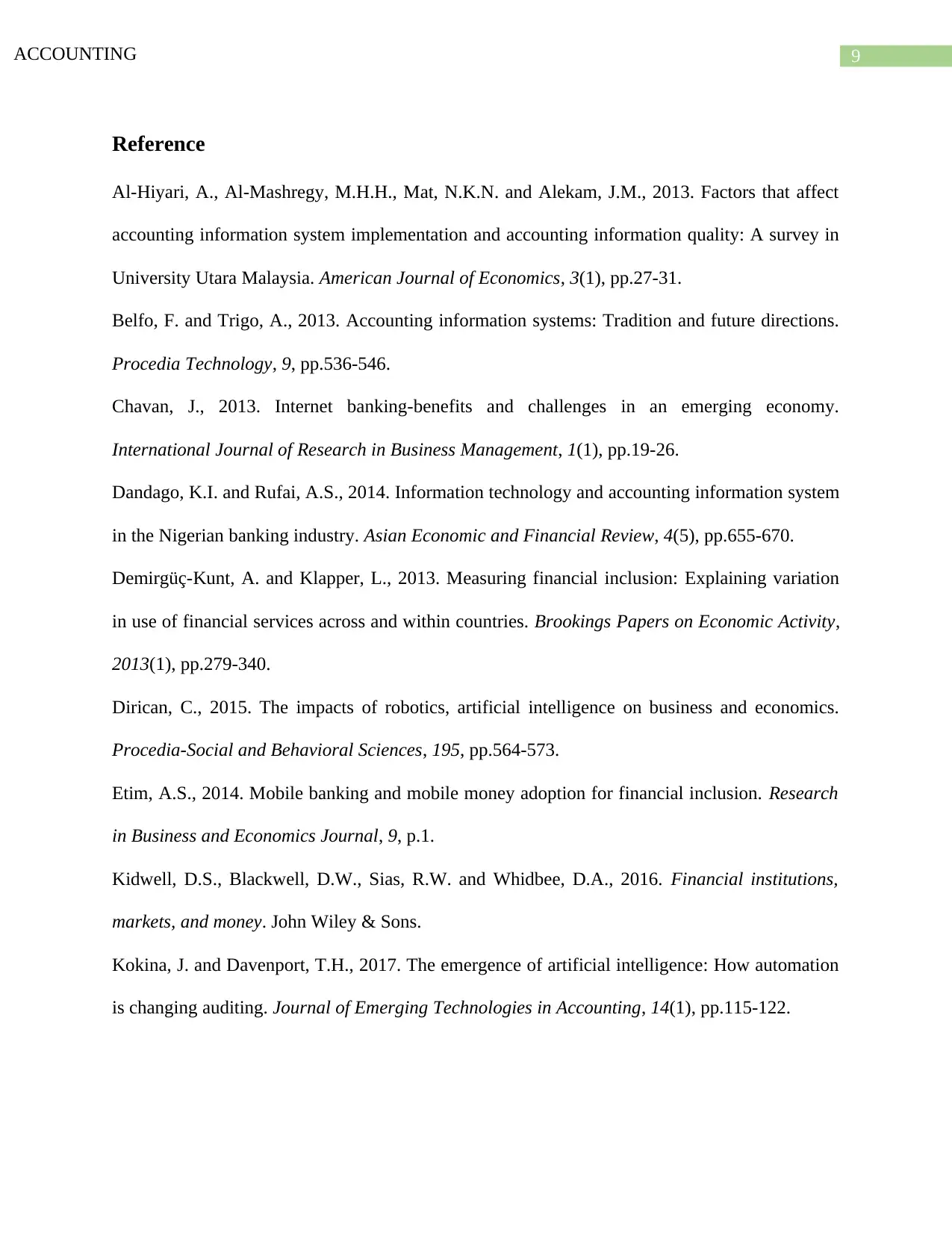
9ACCOUNTING
Reference
Al-Hiyari, A., Al-Mashregy, M.H.H., Mat, N.K.N. and Alekam, J.M., 2013. Factors that affect
accounting information system implementation and accounting information quality: A survey in
University Utara Malaysia. American Journal of Economics, 3(1), pp.27-31.
Belfo, F. and Trigo, A., 2013. Accounting information systems: Tradition and future directions.
Procedia Technology, 9, pp.536-546.
Chavan, J., 2013. Internet banking-benefits and challenges in an emerging economy.
International Journal of Research in Business Management, 1(1), pp.19-26.
Dandago, K.I. and Rufai, A.S., 2014. Information technology and accounting information system
in the Nigerian banking industry. Asian Economic and Financial Review, 4(5), pp.655-670.
Demirgüç-Kunt, A. and Klapper, L., 2013. Measuring financial inclusion: Explaining variation
in use of financial services across and within countries. Brookings Papers on Economic Activity,
2013(1), pp.279-340.
Dirican, C., 2015. The impacts of robotics, artificial intelligence on business and economics.
Procedia-Social and Behavioral Sciences, 195, pp.564-573.
Etim, A.S., 2014. Mobile banking and mobile money adoption for financial inclusion. Research
in Business and Economics Journal, 9, p.1.
Kidwell, D.S., Blackwell, D.W., Sias, R.W. and Whidbee, D.A., 2016. Financial institutions,
markets, and money. John Wiley & Sons.
Kokina, J. and Davenport, T.H., 2017. The emergence of artificial intelligence: How automation
is changing auditing. Journal of Emerging Technologies in Accounting, 14(1), pp.115-122.
Reference
Al-Hiyari, A., Al-Mashregy, M.H.H., Mat, N.K.N. and Alekam, J.M., 2013. Factors that affect
accounting information system implementation and accounting information quality: A survey in
University Utara Malaysia. American Journal of Economics, 3(1), pp.27-31.
Belfo, F. and Trigo, A., 2013. Accounting information systems: Tradition and future directions.
Procedia Technology, 9, pp.536-546.
Chavan, J., 2013. Internet banking-benefits and challenges in an emerging economy.
International Journal of Research in Business Management, 1(1), pp.19-26.
Dandago, K.I. and Rufai, A.S., 2014. Information technology and accounting information system
in the Nigerian banking industry. Asian Economic and Financial Review, 4(5), pp.655-670.
Demirgüç-Kunt, A. and Klapper, L., 2013. Measuring financial inclusion: Explaining variation
in use of financial services across and within countries. Brookings Papers on Economic Activity,
2013(1), pp.279-340.
Dirican, C., 2015. The impacts of robotics, artificial intelligence on business and economics.
Procedia-Social and Behavioral Sciences, 195, pp.564-573.
Etim, A.S., 2014. Mobile banking and mobile money adoption for financial inclusion. Research
in Business and Economics Journal, 9, p.1.
Kidwell, D.S., Blackwell, D.W., Sias, R.W. and Whidbee, D.A., 2016. Financial institutions,
markets, and money. John Wiley & Sons.
Kokina, J. and Davenport, T.H., 2017. The emergence of artificial intelligence: How automation
is changing auditing. Journal of Emerging Technologies in Accounting, 14(1), pp.115-122.
Paraphrase This Document
Need a fresh take? Get an instant paraphrase of this document with our AI Paraphraser
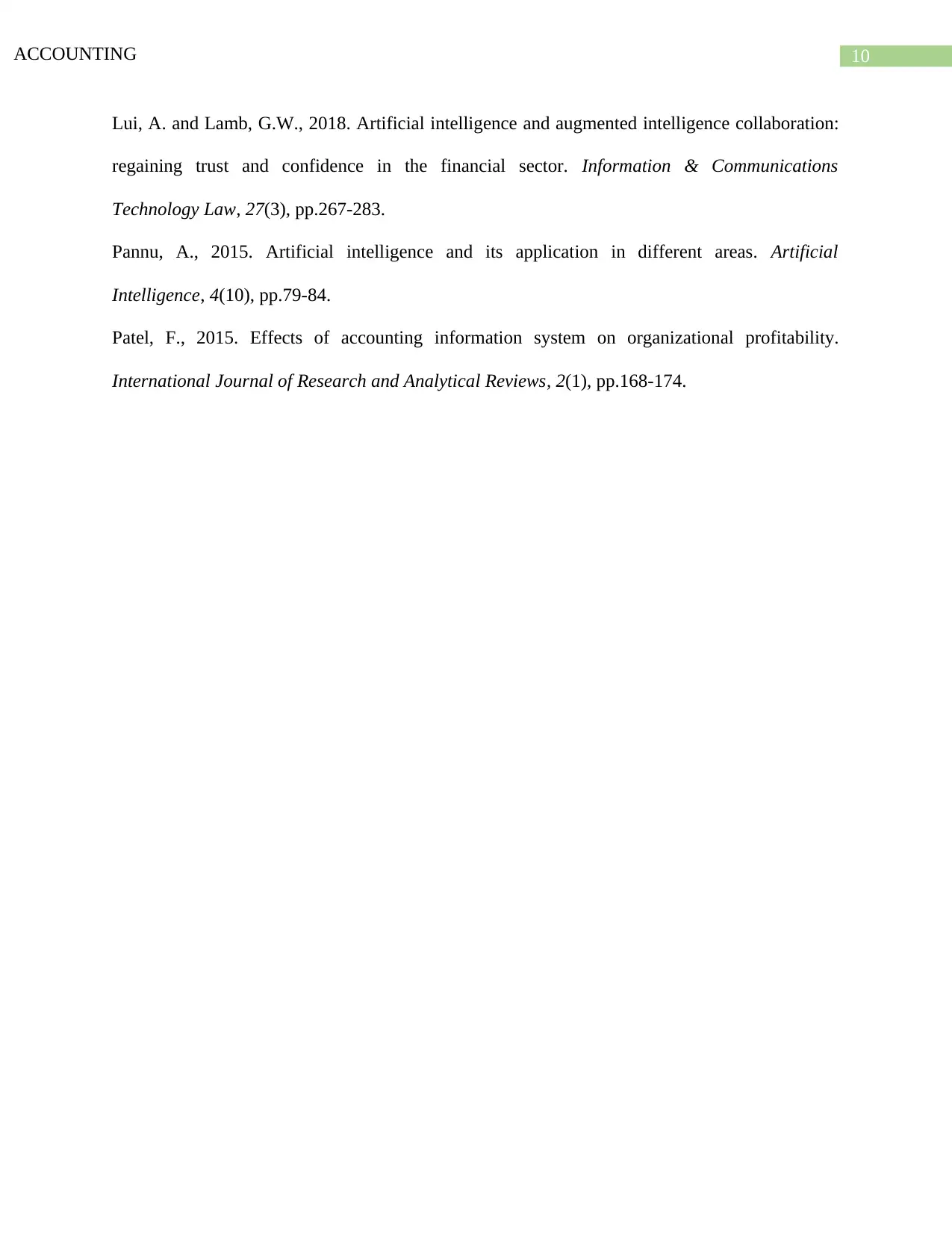
10ACCOUNTING
Lui, A. and Lamb, G.W., 2018. Artificial intelligence and augmented intelligence collaboration:
regaining trust and confidence in the financial sector. Information & Communications
Technology Law, 27(3), pp.267-283.
Pannu, A., 2015. Artificial intelligence and its application in different areas. Artificial
Intelligence, 4(10), pp.79-84.
Patel, F., 2015. Effects of accounting information system on organizational profitability.
International Journal of Research and Analytical Reviews, 2(1), pp.168-174.
Lui, A. and Lamb, G.W., 2018. Artificial intelligence and augmented intelligence collaboration:
regaining trust and confidence in the financial sector. Information & Communications
Technology Law, 27(3), pp.267-283.
Pannu, A., 2015. Artificial intelligence and its application in different areas. Artificial
Intelligence, 4(10), pp.79-84.
Patel, F., 2015. Effects of accounting information system on organizational profitability.
International Journal of Research and Analytical Reviews, 2(1), pp.168-174.
1 out of 11
Related Documents
Your All-in-One AI-Powered Toolkit for Academic Success.
+13062052269
info@desklib.com
Available 24*7 on WhatsApp / Email
![[object Object]](/_next/static/media/star-bottom.7253800d.svg)
Unlock your academic potential
Copyright © 2020–2026 A2Z Services. All Rights Reserved. Developed and managed by ZUCOL.





